| Srl | Item |
| 1 |
ID:
140944


|
|
|
|
|
| Summary/Abstract |
While the Second World War is by far the most studied global conflict, prolific scholarship on its contours and causes has yet to yield consensus. The effectiveness of different military strategies, most notably air bombing, is still disputed. Richard Overy examines the claim that strategic bombing was a major factor in bringing both the European and Pacific wars to an end in 1945. Rejecting the argument that bombing led to surrender in either Germany or Japan, he highlights the significance of outright military defeat and political calculation.
|
|
|
|
|
|
|
|
|
|
|
|
|
|
|
|
| 2 |
ID:
140949
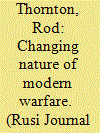

|
|
|
|
|
| Summary/Abstract |
While Western militaries recognise the logic and necessity of ‘irregular warfare’ in their military operations, the manifold aspects of irregular fighting have yet to be mastered fully. Information warfare, for example, appears to be a tool more capably employed by Russia, to the detriment of NATO. Rod Thornton explains how and why Russia has ‘won’ in Crimea by affording subversive information campaigns primacy in its military operations. Acknowledging the twofold constraints of international law and co-ordination that face Western governments seeking to play the same game, Thornton nonetheless expounds how the West might better pursue asymmetry in the security realm.
|
|
|
|
|
|
|
|
|
|
|
|
|
|
|
|
| 3 |
ID:
140947
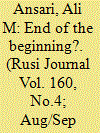

|
|
|
|
|
| Summary/Abstract |
The provisional agreement reached in Vienna by the P5 + 1 and Iran on 14 July 2015 has the hallmarks of a significant diplomatic achievement. It will now run the gauntlet of political scrutiny and be tested in implementation. The agreement is a triumph for Iranian President Hassan Rouhani and his foreign minister Mohammad Javad Zarif. Yet, Ali M Ansari argues, Rouhani now faces a domestic challenge no less difficult than the negotiations as he seeks to balance the aims and ambitions of hardliners and reformists in the political establishment and wider society.
|
|
|
|
|
|
|
|
|
|
|
|
|
|
|
|
| 4 |
ID:
140945
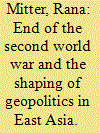

|
|
|
|
|
| Summary/Abstract |
The end of the Second World War in Asia came so quickly that there was no time for the Allies to work out the shape of the new regional order. Indeed, the subsequent fall of the Nationalist Chinese regime and the isolation in Asia of the People's Republic of China meant that no such integrated order was established, with the US instead playing the dominant organising role. In this article, Rana Mitter explores how, in the years since the end of the Cold War, a rising China has started to use the previously downplayed legacy of wartime victory in 1945 to make claims about territory in present-day East Asia.
|
|
|
|
|
|
|
|
|
|
|
|
|
|
|
|
| 5 |
ID:
140943
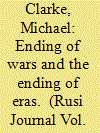

|
|
|
|
|
| Summary/Abstract |
When wars come to an end, even a decisive military victory does not necessarily translate into a decisive political outcome. Michael Clarke reflects on the nature of international warfare, systemic change, and the difficulties of defining with any clarity the outlines of ‘victory’ and ‘defeat’, especially in political terms.
|
|
|
|
|
|
|
|
|
|
|
|
|
|
|
|
| 6 |
ID:
140950
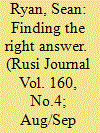

|
|
|
|
|
| Summary/Abstract |
Rapid changes in technology and the democratisation of information capabilities have sparked the concept of ‘War in the Information Age’. Intelligence branches within NATO militaries have been slow to adapt and risk being outpaced. Sean Ryan, a former British military intelligence officer, argues that while some structural changes have occurred, lessons from the Afghanistan and Iraq campaigns about the nature of modern intelligence have not yet been learned, and fundamental changes to the doctrine, training and culture of military intelligence are required.
|
|
|
|
|
|
|
|
|
|
|
|
|
|
|
|
| 7 |
ID:
140948
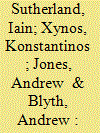

|
|
|
|
|
| Summary/Abstract |
Considerable scholarly effort has been invested in interpreting the existing international legal instruments and diplomatic conventions that apply to kinetic warfare in relation to the field of cyber-warfare. The Tallinn Manual and other documents argue that current humanitarian laws are applicable in cyber-conflict. This includes the concept that particular religious and medical entities should be granted special, protected status along with sites of cultural and religious significance and those containing ‘dangerous forces’. In a kinetic-warfare environment, these sites and non-combatants are identifiable by the use of international symbols such as the Red Cross, Red Crystal and Red Crescent emblems, or other specific signs. Here, Sutherland, Xynos, Jones and Blyth suggest that a simple digital marker could ensure that systems and traffic can be identified as protected in cyber-conflict under the Geneva Conventions.
|
|
|
|
|
|
|
|
|
|
|
|
|
|
|
|
| 8 |
ID:
140946
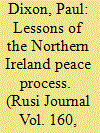

|
|
|
|
|
| Summary/Abstract |
The Northern Irish peace process has brought about a radical shift from violent conflict to relatively peaceful power-sharing between polarised political parties. Paul Dixon argues that by the mid-1980s, the war had reached a stalemate, and the Conservative and Labour governments took a ‘pragmatic realist’ approach to seeking a resolution. This involved using ‘political skills’, or deception and manipulation, to achieve an ‘honourable’ compromise with the enemy.
|
|
|
|
|
|
|
|
|
|
|
|
|
|
|
|
| 9 |
ID:
140951
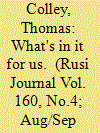

|
|
|
|
|
| Summary/Abstract |
Public support for military interventions is both critical to secure and invariably difficult to maintain. While foreign-policy specialists frequently underscore the importance of having a compelling strategic narrative to legitimise military intervention, most studies fail to explain how transmitted government narratives are actually mediated by the press and ultimately received by the public. Thomas Colley examines the public's response to the UK's strategic narrative on the 2011 military intervention in Libya, assessing the UK government's use of several strands in its messaging and exploring how these were mediated and received by the British media and public.
|
|
|
|
|
|
|
|
|
|
|
|
|
|
|
|
| 10 |
ID:
140952


|
|
|
|
|
| Summary/Abstract |
Analysing paintings presented by Tate Britain's exhibition Fighting History, Emma De Angelis considers whether history painting can further our understanding of war, especially in today's world. Devices such as the visual fusion of time and space in history painting can facilitate new perspectives and reflections on conflict, and provoke an affective reaction that differs greatly from any scholarly analysis of war past and present.
|
|
|
|
|
|
|
|
|
|
|
|
|
|
|
|